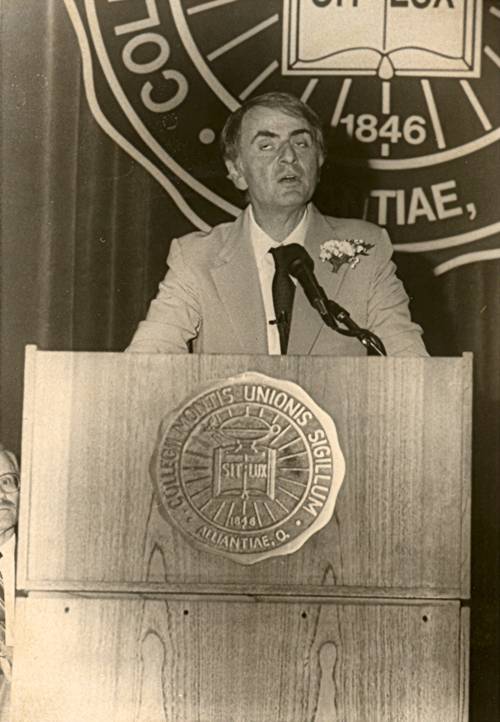
FAQ About Carl Sagan

Who was Carl Sagan?
Carl Sagan was an American astrophysicist, cosmologist, author, and science communicator. He played a major role in popularizing science to the public through his writings and the television series Cosmos: A Personal Voyage. Sagan was also a professor of astronomy and space sciences and a researcher in planetary science.

What is Carl Sagan best known for?
Carl Sagan is best known for his work in popularizing science, particularly through his 1980 television series Cosmos: A Personal Voyage, which reached hundreds of millions of viewers worldwide. He is also recognized for his research in planetary sciences, his role in the U.S. space program, and his prolific writing, which includes the Pulitzer Prize-winning book The Dragons of Eden.

When was Carl Sagan born and when did he die?
Carl Sagan was born on November 9, 1934, in Brooklyn, New York, and he passed away on December 20, 1996, in Seattle, Washington, at the age of 62.

What contributions did Carl Sagan make to the U.S. space program?
Carl Sagan contributed to the U.S. space program in various capacities. He was involved in the Mariner, Viking, Voyager, and Galileo missions, providing crucial scientific guidance. Sagan's work helped develop experiments to recognize extraterrestrial life and understand planetary atmospheres and surfaces, notably his study of Venus, Mars, and Titan.

Did Carl Sagan win any notable awards?
Yes, Carl Sagan won several prestigious awards throughout his career. Notably, he won the Pulitzer Prize for General Non-Fiction for his book The Dragons of Eden in 1978. In addition, he received the NASA Distinguished Public Service Medal twice, and numerous other accolades for his efforts to make science more accessible to the general public.

What is 'Cosmos: A Personal Voyage' about?
Cosmos: A Personal Voyage is a 13-part television series that explores the vast universe, blending scientific storytelling with philosophical reflections on humanity's place in the cosmos. The series covers a wide range of topics including the origin of life, astronomy, biology, and the history of science, and it advocates for critical thinking and scientific inquiry.

How did Carl Sagan influence science communication?
Carl Sagan revolutionized science communication by bridging the gap between complex scientific ideas and public understanding. Through his books and the Cosmos series, he inspired curiosity in millions, emphasizing the wonder of science and its relevance to everyday life. Sagan's use of simple language and captivating narrative made science accessible and exciting to a broad audience.

What was Carl Sagan's role in the Voyager Golden Record project?
Carl Sagan was the chairman of the committee responsible for creating the Voyager Golden Record, a 12-inch gold-plated copper disc containing sounds and images selected to portray the diversity of life and culture on Earth. These records were launched aboard the Voyager spacecraft in 1977 as a message for potential extraterrestrial life. Sagan's involvement included selecting content and overseeing the project's execution.

Which books did Carl Sagan write?
Carl Sagan authored several influential books, both on scientific topics and science fiction. Some of his most notable works include Cosmos, The Dragons of Eden, Broca's Brain, Pale Blue Dot, and the science fiction novel Contact. His writing has been instrumental in making complex scientific ideas accessible and engaging to the general reader.

What was Carl Sagan's view on the possibility of extraterrestrial life?
Carl Sagan was a leading proponent of the scientific search for extraterrestrial life. He advocated for the exploration of the universe and the use of scientific inquiry to search for signs of life beyond Earth. Sagan believed that the possibility of extraterrestrial life was a profound question and was involved in SETI (Search for Extraterrestrial Intelligence) efforts to examine this possibility through scientific means.

How did Carl Sagan impact the field of planetary science?
Carl Sagan's research had a significant impact on planetary science, particularly in understanding the atmospheres and surfaces of planets. His work on the greenhouse effect on Venus helped explain its high surface temperatures, and he was instrumental in studying the seasonal changes on Mars and the atmospheric composition of Jupiter's moon Titan. Sagan's interdisciplinary approach integrated planetary science with biology and astrophysics.

What is Carl Sagan's 'Pale Blue Dot' about?
Pale Blue Dot: A Vision of the Human Future in Space is a book written by Carl Sagan which explores humanity's place in the universe and argues for the continuation of space exploration. The title refers to the famous photograph of Earth taken by the Voyager 1 spacecraft from a distance of about 3.7 billion miles, which Sagan uses to reflect on the fragility and insignificance of Earth in the vast cosmos.

What was Carl Sagan's educational background?
Carl Sagan held a degree in physics from the University of Chicago, where he also earned a Doctor of Philosophy degree (Ph.D.) in Astronomy and Astrophysics. His education laid the groundwork for his distinguished career in science and his role in the U.S. space program, where he applied his knowledge to planetary research and scientific communication.

Did Carl Sagan participate in any television projects besides 'Cosmos'?
Besides Cosmos, Carl Sagan appeared in and contributed to various television projects aimed at popularizing science. Notably, he guest-starred on several programs discussing topics related to astronomy and space exploration and was frequently featured in documentaries and interviews that sought to enlighten the public about scientific developments and phenomena.

What is the legacy of Carl Sagan?
Carl Sagan's legacy is profound in both the scientific community and popular culture. He is remembered for his ability to communicate complex scientific ideas in an understandable and inspiring manner. His work continues to inspire generations of scientists, educators, and enthusiasts. Sagan's influence extends across scientific fields and popular media, forever shaping the way science is communicated and perceived by the public.

How did Carl Sagan's work influence later science communicators?
Carl Sagan set a standard for science communication that paved the way for future generations. His emphasis on clarity, storytelling, and enthusiasm for the subject matter influenced many science communicators, including Neil deGrasse Tyson, who hosted a revival of Cosmos. Sagan's approachable style and commitment to education left a lasting impact on how science is conveyed to the public today.

Was Carl Sagan involved in any controversies?
Carl Sagan's outspoken views occasionally led to controversies, particularly concerning his later discredited "nuclear winter" theory, which postulated severe global climatic effects following nuclear war. Some scientists criticized his overly public stance and media involvement. Despite these controversies, Sagan remained a respected and influential figure in science and popular culture.

What was Carl Sagan's philosophy on science and religion?
Carl Sagan viewed science and religion from a philosophical perspective, acknowledging the mystery and wonder of the universe while advocating for a scientific approach to understanding it. He was often critical of organized religion when it conflicted with evidence-based science but was open to discussions on how science and spiritual contemplation could coexist. He believed that science could encourage a humble appreciation of the cosmos.

Did Carl Sagan receive any posthumous honors?
Yes, Carl Sagan received several honors posthumously. His legacy was commemorated by the naming of the Sagan Planet Walk in Ithaca, New York, as well as the Carl Sagan Institute at Cornell University. Additionally, the asteroid 2709 Sagan is named in his memory, recognizing his contributions to astronomy and science communication.

How did Carl Sagan inspire future explorers and scientists?
Carl Sagan inspired future explorers and scientists through his passionate communication of the wonders of the universe. His ability to engage people with the curiosity-driven questions of science motivated many to pursue careers in astronomy, astrophysics, and beyond. Sagan's work continues to inspire those who seek to explore and understand the cosmos, leaving an indelible mark on the field of science.
